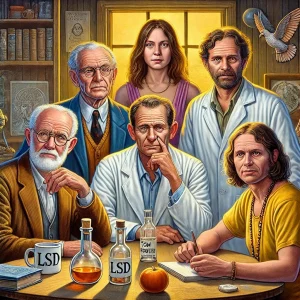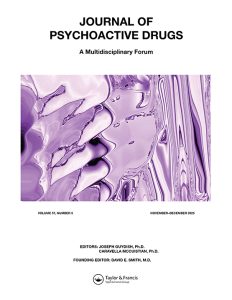 In the 1950s and 1960s, a group of forward-thinking individuals, including Bill Wilson, Sidney Cohen, Betty Eisner, Tom Powers, and Gerald Heard, embarked on an unconventional journey that would intersect the worlds of addiction recovery and psychedelic research. These early experiments with LSD were initiated to explore its potential therapeutic benefits, especially in facilitating spiritual experiences that could aid in the recovery process for alcoholics. This article takes a closer look at the key figures involved in these groundbreaking experiments and their contributions to this intriguing chapter in the history of addiction treatment and psychological exploration.
In the 1950s and 1960s, a group of forward-thinking individuals, including Bill Wilson, Sidney Cohen, Betty Eisner, Tom Powers, and Gerald Heard, embarked on an unconventional journey that would intersect the worlds of addiction recovery and psychedelic research. These early experiments with LSD were initiated to explore its potential therapeutic benefits, especially in facilitating spiritual experiences that could aid in the recovery process for alcoholics. This article takes a closer look at the key figures involved in these groundbreaking experiments and their contributions to this intriguing chapter in the history of addiction treatment and psychological exploration.
1. Bill Wilson: The Visionary Co-Founder of Alcoholics Anonymous
Bill Wilson, co-founder of Alcoholics Anonymous (AA), is widely known for his role in establishing one of the most successful self-help organizations for recovering alcoholics. However, less known is his interest in exploring unconventional methods to induce spiritual awakenings—experiences he believed were crucial for achieving and maintaining sobriety. After his own profound spiritual experience, which he described as a “white light” moment, Wilson became fascinated with the idea that similar experiences could be facilitated through chemical means.
In the 1950s, Wilson became interested in LSD (lysergic acid diethylamide), a powerful hallucinogenic substance that was being studied for its potential therapeutic benefits. Wilson believed that LSD might help alcoholics achieve a transformative spiritual awakening that could assist in their recovery. His openness to such an unconventional approach reflected his broader philosophy of exploring all possible avenues to aid those struggling with addiction.
2. Sidney Cohen: The Psychiatrist and Pioneer in Psychedelic Research
Dr. Sidney Cohen was a psychiatrist and one of the early pioneers in the study of LSD and other psychedelics for therapeutic use. Cohen was particularly interested in the potential of psychedelics to treat various mental health conditions, including alcoholism. He conducted some of the first clinical trials on LSD, exploring its effects on consciousness and its potential to produce profound psychological and spiritual experiences.
Cohen’s research demonstrated that LSD could sometimes lead to a mystical or spiritual experience that might help patients achieve greater self-awareness and potentially lead to therapeutic breakthroughs. It was through Cohen’s pioneering work that Wilson became intrigued by the potential applications of LSD in treating alcoholism. Cohen’s scientific rigor and cautious optimism about the therapeutic potential of psychedelics provided a foundation for exploring these substances further in a controlled environment.
3. Betty Eisner: The Clinical Psychologist Exploring Psychedelic Therapy
Betty Eisner was a clinical psychologist who collaborated with Sidney Cohen and other researchers on early studies involving LSD and other psychedelic substances. Eisner was particularly interested in the potential of psychedelics to enhance psychotherapy and was one of the early practitioners who believed that LSD could be used to facilitate breakthroughs in therapy by helping patients access repressed emotions and memories.
Eisner’s approach was holistic; she saw psychedelics as a tool that could complement traditional therapy methods. Her work with Cohen and others laid the groundwork for using psychedelics in conjunction with psychotherapy to treat alcoholism and other mental health disorders. Eisner’s interest in the spiritual aspects of recovery also resonated with Wilson’s views, making her a valuable collaborator in these early LSD experiments.
4. Tom Powers: The Trusted AA Associate and Spiritual Seeker
Tom Powers was a close associate of Bill Wilson and an early member of Alcoholics Anonymous. He was also deeply involved in the spiritual and philosophical aspects of recovery. Powers co-authored the book “12 Steps and 12 Traditions” with Wilson and was instrumental in helping to shape the spiritual foundation of AA.
Powers’ involvement in the LSD experiments stemmed from his close relationship with Wilson and his shared interest in exploring new ways to enhance spiritual growth and recovery. Like Wilson, Powers was open to unconventional approaches if they promised to help alcoholics achieve lasting sobriety. His participation in these experiments reflected his commitment to the ongoing exploration of spiritual solutions to addiction.
5. Gerald Heard: The Philosopher and Advocate for Expanded Consciousness
Gerald Heard was a British-born philosopher, writer, and advocate for expanding human consciousness. Heard was an influential figure in the countercultural and intellectual circles of the mid-20th century and a significant influence on Bill Wilson. Heard believed that psychedelics, particularly LSD, could facilitate spiritual growth and higher states of consciousness, ideas that intrigued Wilson given his interest in spiritual awakening as a critical component of recovery.
Heard’s philosophical perspective was that psychedelics could be used to enhance spiritual development and that these substances were tools that could help people achieve a greater understanding of themselves and the universe. His ideas provided intellectual and spiritual support for Wilson’s interest in exploring LSD as a potential aid in fostering spiritual experiences for alcoholics.
The Intersection of Recovery and Psychedelic Exploration
The convergence of these figures in the context of LSD research reflects a unique moment in the history of addiction treatment and psychological exploration. Bill Wilson’s interest in LSD was not a rejection of AA’s principles but rather an extension of his lifelong quest to help alcoholics achieve spiritual awakening. Sidney Cohen and Betty Eisner brought scientific credibility and a therapeutic framework to the table, ensuring that the experiments were conducted with a degree of rigor and professionalism. Tom Powers and Gerald Heard added spiritual and philosophical dimensions, grounding the exploration in a broader quest for meaning and transcendence.
Legacy and Controversy
While these early experiments did not lead to the integration of LSD into AA’s formal practices, they did contribute to a broader dialogue about the role of spirituality, consciousness, and unconventional methods in addiction recovery. The willingness of these pioneers to explore new frontiers, despite the controversies and challenges, highlights their commitment to understanding and expanding the boundaries of human experience and healing.
Today, as modern research re-examines the therapeutic potential of psychedelics, the early work of these figures remains relevant. Their efforts remind us of the importance of keeping an open mind in the quest for recovery and spiritual growth. The intersection of their paths—at the crossroads of addiction recovery and psychedelic exploration—offers valuable lessons about the power of collaboration and the courage to explore the unknown.
The collaboration between Bill Wilson, Sidney Cohen, Betty Eisner, Tom Powers, and Gerald Heard represents a bold and experimental chapter in the history of addiction treatment. By bridging the gap between spiritual recovery and scientific exploration, they paved the way for future discussions on the role of psychedelics in therapy. As we continue to explore new methods for healing, their legacy serves as a testament to the spirit of innovation and the enduring quest for understanding the complexities of the human mind and spirit.




